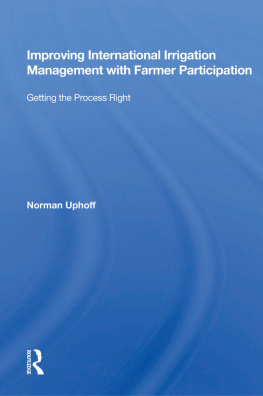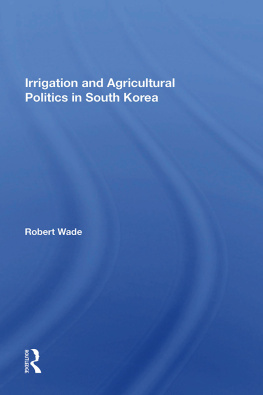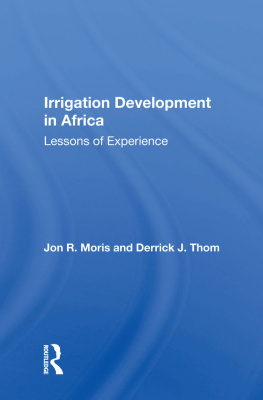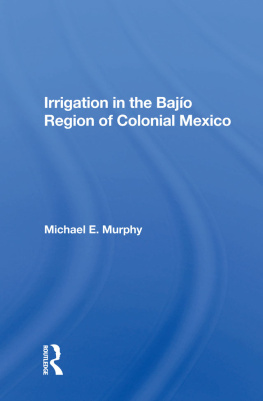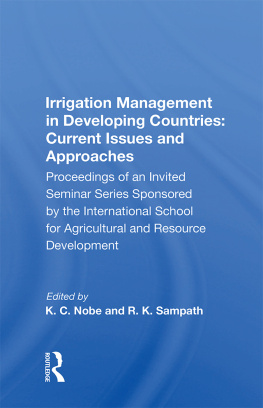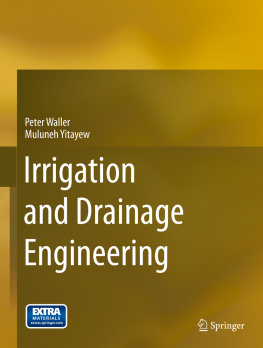Improving International
Irrigation Management
with Farmer Participation
Studies in Water Policy and Management
Charles W. Howe, General Editor
Improving International Irrigation Management with Farmer Participation: Getting the Process Right, Norman Uphoff
Municipal Water Demand: Statistical and Management Issues, Clive Vaughan Jones, John J. Boland, James E. Crews, C, Frederick DeKay, and John R. Morris
Flood Plain Land Use Management: A National Assessment, Raymond J. Burby and Steven P. French with Beverly A. Cigler, Edward J. Kaiser, David H. Moreau, and Bruce Stiftel
Natural Radioactivity in Water Supplies, Jack K. Horner
Energy and Water Management in Western Irrigated Agriculture, edited by Norman K. Whittlesey
Irrigation Management in Developing Countries: Current Issues and Approaches, edited by K. C. Nobe and R. K. Sampath
Irrigation Investment, Technology, and Management Strategies for Development, edited by K. William Easter
Watershed Resources Management: An Integrated Framework with Studies from Asia and the Pacific, edited by K. William Easter, John A. Dixon, and Maynard M. Hufschmidt
About the Book and Author
Traditionally, indigenous irrigation in many countries of Asia, Africa, and Latin America has been managed quite well by water users, who design, build, operate, and maintain often sophisticated, but usually small-scale, systems. More recently, in connection with large-scale development programs and government-managed schemes, the planned introduction of water user associations is increasing with some notable success. Dr. Uphoff brings together lessons from indigenous and government-managed irrigation systems worldwide and proposes workable approaches to participatory irrigation management in both the large- and small-scale contexts.
Norman Uphoff is professor of government and chairman of the Rural Development Committee in the Center for International Studies at Cornell University.
Improving International Irrigation Management with Farmer Participation
Getting the Process Right
Norman Uphoff
Studies in Water Policy and Management, No. 11
First published 1986 by Westview Press
Published 2018 by Routledge
52 Vanderbilt Avenue, New York, NY 10017
2 Park Square, Milton Park, Abingdon, Oxon OX14 4RN
Routledge is an imprint of the Taylor & Francis Group, an informa business
Copyright 1986 by Taylor & Francis
All rights reserved. No part of this book may be reprinted or reproduced or utilised in any form or by any electronic, mechanical, or other means, now known or hereafter invented, including photocopying and recording, or in any information storage or retrieval system, without permission in writing from the publishers.
Notice:
Product or corporate names may be trademarks or registered trademarks, and are used only for identification and explanation without intent to infringe.
Library of Congress Cataloging-in-Publication Data
Uphoff, Norman Thomas.
Improving international irrigation management with
farmer participation.
Bibliography: p.
1. IrrigationManagementCitizen participation.
I. Title.
HD1714.U64 1986 333.913 86-23414
ISBN 13: 978-0-367-01367-7 (hbk)
The review of the literature and analysis offered here were undertaken to provide the empirical and conceptual bases for a paper on Improving Policies and Programs for Farmer Organization and Participation in Irrigation Water Management . Preparation of that paper as well as this work was supported by the Water Management Synthesis II Project, funded by US AID and administered by the Consortium for International Development. The policy paper, published at the end of 1985, was written with Ruth Meinzen-Dick (Rural Sociology) and Nancy St. Julien (Regional Planning) who assisted with this state-of-the-art study during much of the last two years.
This undertaking was enriched by discussions with colleagues in the Cornell Irrigation Studies Group: Benjamin Bagadion, Jr., Bryan Bruns (who also did some of the initial case study analyses), E. Walter Coward, Jr., John Duewel, Barbara Lynch, and Ujjwal Pradhan (Rural Sociology); Edward Martin and C. M. Wijayaratna (Agricultural Economics); Gerard Finin and Ruth Yabes (Regional Planning); Chris Wensley and Robert Yoder (Agricultural Engineering); and Milan Rodrigo (Communication Arts).
Helpful comments on the manuscript were given by Bagadion, Coward, Finin, Lynch, Meinzen-Dick and St. Julien as well as by Jayantha Perera, Deputy Director of the Agrarian Research and Training Institute in Sri Lanka who was visiting Cornell during the draft's completion. Dr. Douglas J. Merrey, at the time Senior Social Science Advisor in the Office of Rural and Institutional Development, Bureau for Science and Technology, US AID (now with the International Irrigation Management Institute), oversaw this activity for the Water Management Synthesis Project and made many helpful inputs.
Debi Ostrander and Virginia Hicks in the Center for International Studies at Cornell provided valuable logistical support, and Jane Kellogg did the invaluable job of word processing the manuscript through its several stages. All of their assistance and advice are gratefully acknowledged.
This effort benefited from the deliberations of an international seminar on "Community Responses to Irrigation" organized by P. K. Bardhan and myself for the South Asia Committee of the Social Science Research Council, New York,and held in cooperation with the Indian Institute of Management in Bangalore, January 3-6, 1984. This seminar provided fruitful opportunity to discuss and compare case experiences in some depth.
Participants included Dr. Merrey as well as two members of the Ford Foundation staff in New Delhi who have contributed greatly to the conceptualization of irrigation systems management, Robert Chambers and Gilbert Levine. I would like to express my appreciation to them and to the other seminar participants, whose papers are included in the Bibliography. The report of the seminar is found in WAMANA , the water management newsletter published by the Indian Institute of Management, Bangalore, October, 1984.
In May 1984, a workshop was held at Cornell on "Farmer Participation and Organization for Improved Water Management" under Water Management Synthesis Project auspices. This gave an opportunity to exchange ideas and experience with WMSP colleagues from Colorado State University and Utah State University, as well as other invited workshop participants. The discussion and analysis in Part III of this paper particularly benefited from the deliberations of that workshop.
Norman Uphoff
Recent years have witnessed a marked increase in concern at both national and international levels about the poor performance of irrigation schemes in many developing countries: rapid population growth is intensifying mankind's demands on an increasingly scarce resource which is essential to its livelihood... yet efficiency of water use on many existing systems continues to be very low.
...there has been a growing realization that much of the poor performance [in irrigation systems] stems from fundamental weaknesses in the human processes of planning and management , which no amount of investment in technological hardware is going to overcome on its own.

